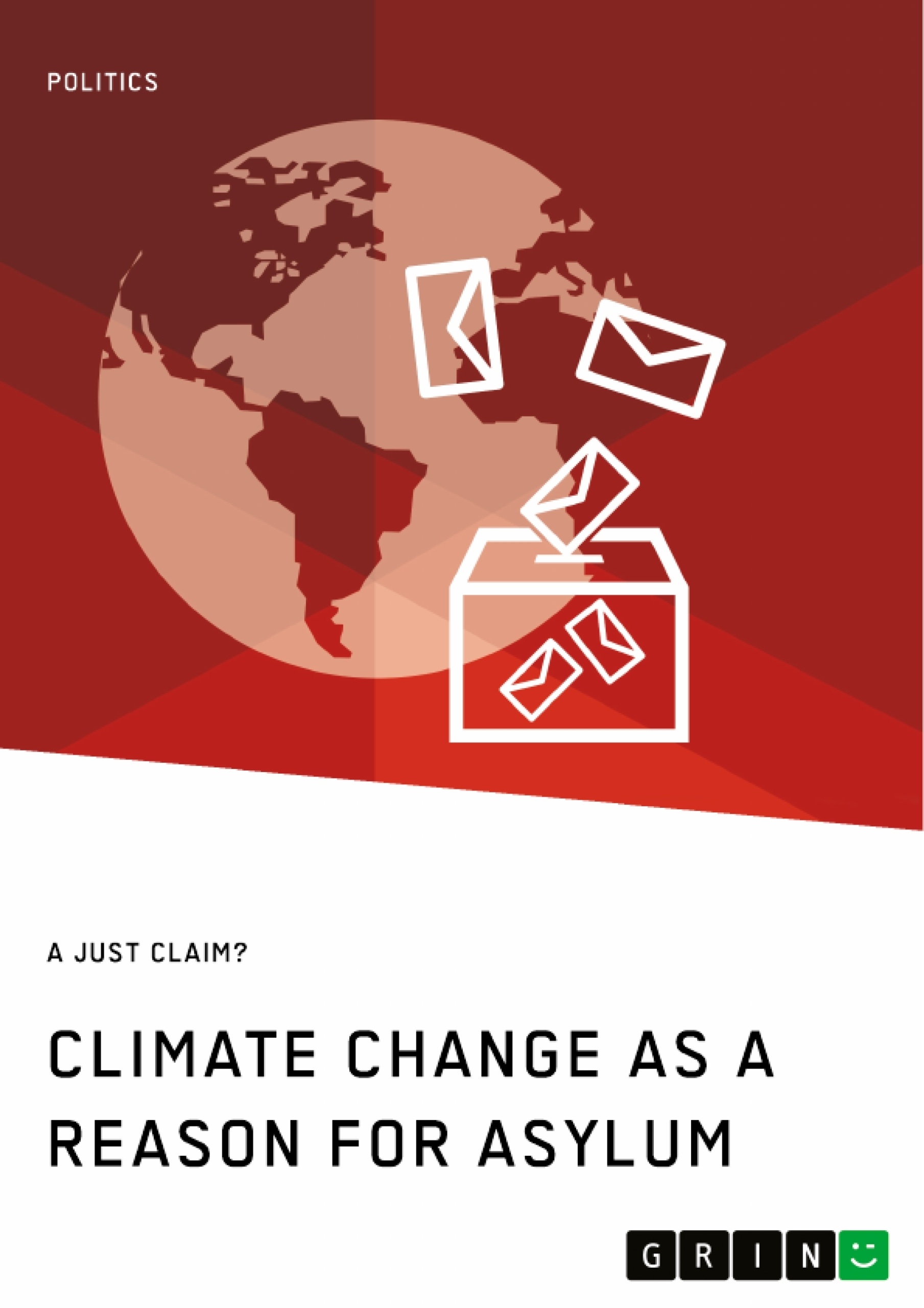The verdict of the UN Human Rights Committee poses the issue of a potential entitlement to asylum for humans experiencing climate-induced displacement. Thus this thesis is gonna examine this rather new topic of the political science: the future forced migration in the context of climate change and its consequences for the receiving countries and their legal systems. Consequently, for one thing in this thesis it will be tried to point out the causal correlation of climate change and migration and, moreover, on this basis tried to undertake reflections regarding a potential need for reformation of national and international refugee and asylum law in order to protect the affected people. Since justice is highly important for social cooperation and also currently being tested by not only the global resource scarcity and its resulting conflicts, but also, as shall be shown with this thesis, by the that very human-induced climate change, the focus of this work shall not be put on the potential implementation of climate refugees into the law of nations, but rather on the more philosophical question of justification regarding a potential asylum for the (prospective) victims of climate change.
The leading question of this examination is thus gonna be, if the claim to asylum due to the persecution through human-induced climate change is a just claim – or just a claim. Because the abstract term of justice and its concepts, which vary depending on the author, could fill a thesis on its own, this work will use the specific theory of justice of political philosopher John Rawls and thus will, in pursuit of the main goal to concretely judge the obligation of states towards climate refugees on basis of an abstract justice term, outline his theory of “justice as fairness”.
Inhaltsverzeichnis (Table of Contents)
- Introduction
- Problem Formulation
- State of Research
- Topical Relevance
- Scientific Approach
- Climate Change and Migration
- Conceptual History and Definitions
- Legal Status of Climate Refugees
- Hotspots for Climate-Induced Displacement
- Island Nations
- Tropical Coasts
- Sahel
- John Rawls' Conception of Justice
- Justice as Fairness
- Principles of Justice
- Original Position
- Law of People
- Justice of Asylum for Climate Refugees
- Judgement by Rawls' Principles of Justice
- Climate Asylum Laws in Original Position
- Conclusion
Zielsetzung und Themenschwerpunkte (Objectives and Key Themes)
This thesis examines the emerging issue of climate-induced displacement and the potential entitlement to asylum for individuals affected by climate change. It aims to analyze the causal correlation between climate change and migration, considering its consequences for receiving countries and their legal systems. The work focuses on the ethical justification for asylum for climate refugees, specifically using John Rawls' theory of "justice as fairness" to assess the obligation of states towards these individuals.
- Climate change and its impact on forced migration
- The legal status and rights of climate refugees
- The ethical considerations surrounding climate asylum
- John Rawls' theory of justice and its implications for climate refugees
- The need for potential reforms in national and international refugee and asylum law.
Zusammenfassung der Kapitel (Chapter Summaries)
The introduction sets the stage by establishing the relevance of climate change and migration as a pressing international issue. It delves into the problem formulation, highlighting the increasing global awareness and activism surrounding climate change. The chapter explores the existing state of research on climate-induced displacement and the recent landmark ruling by the UN Human Rights Committee on the deportation of climate migrants. It underscores the topical relevance of the issue and outlines the scientific approach employed in the thesis.
Chapter 2 provides a comprehensive analysis of the relationship between climate change and migration. It delves into the historical and conceptual understanding of climate refugees, discussing their legal status under international law. The chapter further identifies hotspots for climate-induced displacement, examining specific regions such as island nations, tropical coasts, and the Sahel.
Chapter 3 introduces John Rawls' conception of justice, focusing on his theory of "justice as fairness". It explores the principles of justice outlined by Rawls, the concept of the "original position," and his "law of people." This chapter lays the theoretical foundation for analyzing the ethical justification for climate asylum in the subsequent chapters.
Chapter 4 examines the issue of justice for climate refugees through the lens of Rawls' theory. It assesses whether the claim to asylum due to persecution through human-induced climate change can be considered a "just claim". The chapter analyzes the implications of Rawls' principles of justice and explores the potential for incorporating climate asylum laws into the "original position."
Schlüsselwörter (Keywords)
This thesis focuses on climate change, forced migration, climate refugees, asylum, justice, John Rawls, justice as fairness, international law, human rights, and the obligation of states. It explores the ethical and legal dimensions of climate-induced displacement and its implications for global governance and the future of international refugee law.
- Citation du texte
- Anonym (Auteur), 2020, Climate Change as a Reason for Asylum. A just Claim?, Munich, GRIN Verlag, https://www.grin.com/document/935461



